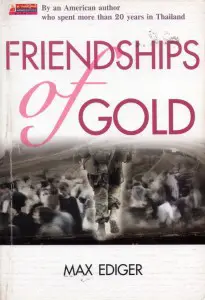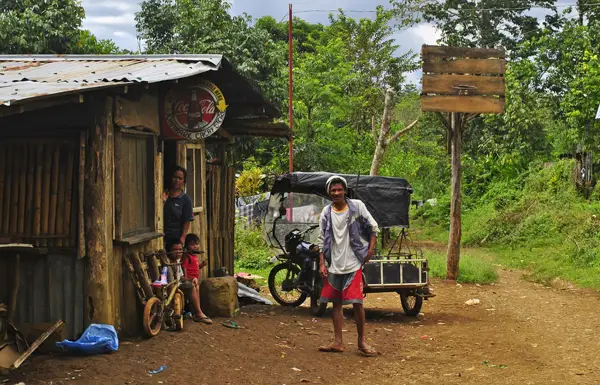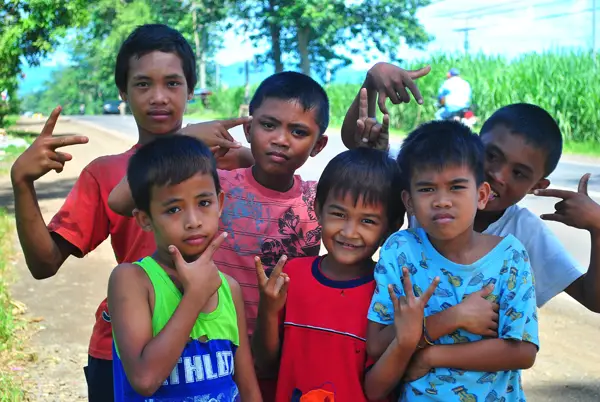 Friendship of Gold by American author Max Ediger was first published in 2001 by Thai publishing house Nanmeebooks, but has long since been out of print. That was until June last year, when Books Mango took over the project and made the book available on Kindle and on the Bangkok Books online store. This was great news as Ediger’s book deserves the attention of all English-speaking readers who live in or are just passing through Bangkok.
Friendship of Gold by American author Max Ediger was first published in 2001 by Thai publishing house Nanmeebooks, but has long since been out of print. That was until June last year, when Books Mango took over the project and made the book available on Kindle and on the Bangkok Books online store. This was great news as Ediger’s book deserves the attention of all English-speaking readers who live in or are just passing through Bangkok.
According to the book cover, Max Ediger spent more than twenty years in Thailand, where he did volunteer work for the Mennonite Central Committee, a relief, service, community development, and peace agency. Apart from Thailand, he has also served in Burundi, Vietnam and Hong Kong. It is obvious to anyone reading Friendship of Gold that Ediger was not idle in his travels but rather busy interacting with the locals, tying to understand their hardships and help them however he could.
Although a work of fiction about poor slum dwellers fighting against eviction from Soi 3 Community, it is hard for the reader not to think of Klong Toey, the poorest area in Bangkok, famous for its slum and infamous market. Ediger’s vivid description of the squalid conditions in which many poor Thais live can make you stare at the printed words on the page in disbelief as you continue reading the book in the air-conditioned living room of the high-rise condominium you live in. But, for the people of Soi 3 Community in Friendship of Gold, the slum is all they have and they’re about to lose even that as the landowner intends to sell the land to a hotel developer.
The action of the book starts in 1972 when a group of American soldiers go on a killing rampage after their squad captain is shot dead in Vietnam. None of the Vietnamese locals is spared and when the noise of the machine guns and grenades fades away, Tony is one of the few American soldiers left standing. But for the atrocities committed, he has to live the rest of his life with the guilt of killing an innocent girl and the consequences of his rage, including being consigned to a wheelchair.
Abandoning his wife and daughter in the US, Tony finds himself in the Bangkok of the late 1980s, drinking his days away and fighting every night the memories of his actions in Vietnam. Wheeling his way through the maze of rundown houses with their corrugated iron roofs, Tony is known to the Soi 3 Community where he lives as “Farang Baa,” the Crazy Foreigner, who’s not good at anything but knocking down their market wares with his erratic wheelchair driving skills.
In a way, Tony’s story is quite familiar to the long-time resident of Thailand: “Finally he came to Thailand, hoping that being in Asia might help. He taught English for more than a year and studied Thai. During this time he kept some control over the nightmare and had also been able to decrease his drinking, but then suddenly the nightmare returned with such fierceness that he had to quit both teaching and studies. He had come to this slum, hoping he could hide and eventually forget.”
The other inhabitants of the Soi 3 Community had come to Bangkok from poor villages up north, hoping to find a better job in the capital. Among these is Tony’s neighbour, Nimit, a police officer, who has seen his parents’ farmland being taken away and subsequently seen his parents die in despair. Although Farang Baa does not wish to make any friends, Tony and Nimit gradually build a strong relationship, but hard days come ahead when eviction notices start threatening the little security the slum dwellers had until then.
Nimit cannot bear to see the people of Soi 3 Community lose the roofs over their heads and starts the fight against their eviction. Soon he is joined by Khru Mali, the community’s school teacher; Ti, an orphaned girl who befriends Tony and buys him whiskey whenever he needs a drink; Granny Lek, one of the community’s eldest; plus a score of other colourful characters that seems to shape out the slum community from the pages of the book.
Friendship of Gold is a heartfelt story of a group of people trying to win not only their right for a place to live but also their dignity. As the readers turn page after page, they see how empowerment and social justice is possible even in the least expected places and how, if people stick together and do not give up, anything is possible.
The author dedicates the book to “all the friends in Thailand who have proven to me again and again that their friendship is truly golden. Their commitment to justice and human rights and their perseverance in the face of many difficulties has inspired me tremendously.”
Even though not quite a literary masterpiece, Friendship of Gold is worth reading for its message of hope and ability to lift the readers’ spirit and even draw a few tears in the corner of their eyes. Because Tony, Nimit, Ti, and Mali were able to work out their differences, to accept and forget their pasts, and to realize that what kept them strong and together was each other’s honest feelings: “Money is silver, but friendship is gold. It’s the most precious thing we can have. If we have friends, we have life. Always protect your friendships. They are the most valuable things you will ever have in your life.”
Max Ediger was born in Oklahoma in 1946 and he has been involved in religious voluntary service since the age of nineteen. His writing career started in 1971 while working in Vietnam and ever since has penned several books of poetry, fiction and nonfiction that deal with communities struggling for justice and human rights. His interaction with refugees, slum communities, poor villagers and victims of war has greatly influenced his writings in which he attempts to give a voice to those who are not heard.
Apart from Friendship of Gold, Max Ediger has also written two books of poetry, A Vietnamese Pilgrimage (Faith and Life Press, 1978) and Dialogue with a Dream (self-published, 1998); a book for children, Caleb and Shalev (Eloquent Books, 2010); and two books of non-fiction, Release Us from Bondage. Six Days in a Vietnamese Prison (MCC, 1974) and Differences (Xlibris Corp, 2005; reprinted as an ebook by Bangkok Books, 2011).
Photography by Regin Reyno
Initially published in “Bangkok Trader” (Vol.7, No.4, March 2013)





